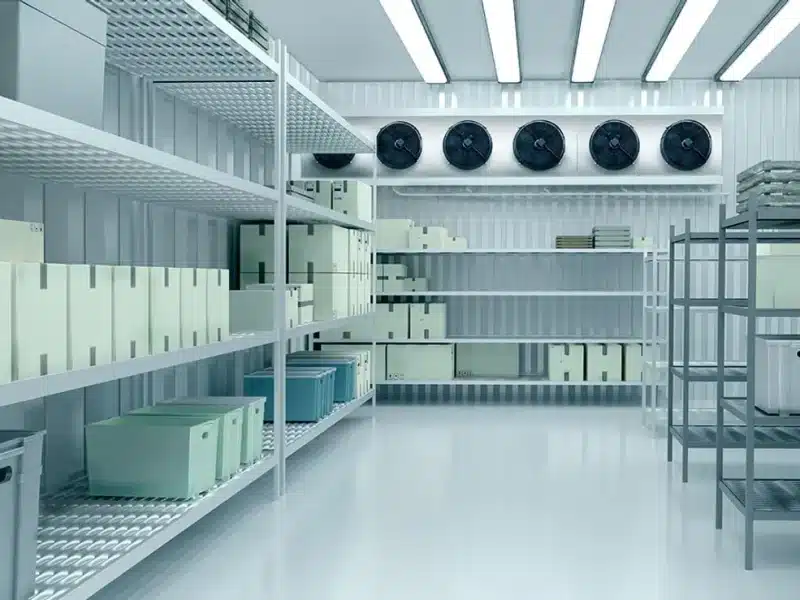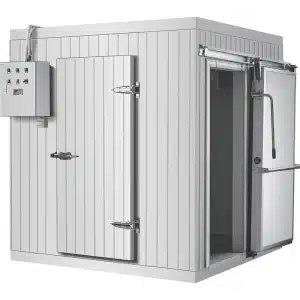

Selecting the ideal cold room is a critical decision that directly affects the safe storage of perishable goods, the quality of your products, and your overall operational efficiency. Whether you’re managing a food processing facility, a pharmaceutical warehouse, or any business that relies on precise temperature control, investing in a high-quality cold room is key to maintaining product integrity while minimizing energy and maintenance costs. Here are 10 essential tips to guide you in choosing the right cold room that meets your business needs.
1. Define Your Storage Needs
Begin by evaluating the types and quantities of products you intend to store. Ask yourself:
- What are your temperature requirements?
Determine if your products require frozen, chilled, or ambient conditions.
- How much storage capacity do you need?
Consider both current inventory levels and future growth projections.
A thorough analysis of your storage needs ensures you select a cold room with the appropriate features and precise temperature controls.
2. Size Matters
The dimensions of your cold room are crucial for efficient operations. Consider the following:
- Volume of Storage:
Choose a unit that not only meets your current demands but also accommodates future expansion.
- Spatial Considerations:
Measure the width, length, and height of the available space to ensure the cold room will fit seamlessly into your facility.
- Organization & Accessibility:
A slightly larger room can facilitate better organization and smoother movement of goods.
Investing in the right size helps maximize storage capacity and operational flexibility.
3. Insulation Quality
High-grade insulation is essential for maintaining stable temperatures and reducing energy consumption. Look for cold rooms that use:
- Premium Materials:
Materials like polyurethane foam or sandwich panels provide superior insulation.
- Temperature Stability:
Good insulation minimizes temperature fluctuations, ensuring the integrity of your stored products.
Quality insulation is not only key to product preservation but also plays a significant role in long-term energy savings.
4. Temperature Control
Accurate and adjustable temperature controls are a must-have feature. Consider a cold room that offers:
- Reliable Settings:
Consistent performance for maintaining precise conditions, whether freezing, chilling, or ambient.
- Easy Adjustments:
Simple interfaces that allow for quick modifications to adapt to different product requirements.
Precise temperature management ensures your products are always stored under optimal conditions.
5. Energy Efficiency
Energy-efficient cold rooms reduce both operational costs and environmental impact. Look for systems equipped with:
- LED Lighting and Efficient Compressors:
These features help lower electricity usage.
- Well-Insulated Doors:
Minimize heat exchange and improve overall energy performance.
Investing in energy efficiency not only cuts costs but also contributes to a greener operation.
6. Easy Maintenance
A cold room designed for easy upkeep can save time and money over its lifespan. Prioritize models that feature:
- Corrosion-Resistant Materials:
Enhance durability and ease of cleaning.
- Smooth, Accessible Surfaces:
Simplify routine maintenance tasks and ensure the unit remains in top condition.
An easily maintained cold room minimizes downtime and supports long-term operational reliability.
7. Quality of Construction
The long-term performance of your cold room depends on its construction quality. Ensure your chosen unit:
- Uses High-Quality Materials:
Meets industry standards for durability and performance.
- Provides Superior Reliability:
Offers better temperature control and energy efficiency, making it a worthwhile investment.
A robust construction guarantees that your cold room will serve your business reliably for years to come.
8. Reliable Brand and Supplier
Choosing a reputable brand and supplier is critical. When evaluating potential partners:
- Research Customer Reviews:
Look for positive feedback and a proven track record.
- Evaluate Warranty and Support:
A trusted supplier will offer comprehensive warranties and excellent customer service.
Partnering with a reliable provider ensures you receive a high-quality product and ongoing support throughout its lifecycle.
9. Security Features
Protect your valuable inventory with advanced security measures. Consider cold rooms that include:
- Lockable Doors and Security Alarms:
Prevent unauthorized access and safeguard your products.
- Temperature Monitoring Systems:
Provide real-time alerts to ensure compliance with safety standards.
Enhanced security features add an extra layer of protection, minimizing the risk of spoilage or theft.
10. Compliance with Regulations
Ensure that the cold room adheres to all relevant industry regulations and safety standards:
- Regulatory Compliance:
Particularly important for food storage, pharmaceuticals, and other sensitive industries.
- Certification and Standards:
Verify that the unit meets local and international safety guidelines to avoid potential penalties or operational disruptions.
Compliance guarantees that your operations remain within legal standards, contributing to overall business stability.
Conclusion
Choosing the perfect cold room for your business involves careful consideration of several key factors—from storage needs and size to insulation, energy efficiency, and regulatory compliance. By following these 10 essential tips, you can make an informed decision that not only enhances product safety and quality but also boosts operational efficiency and reduces costs.
Investing in a high-quality cold room is an investment in the long-term success and sustainability of your business. Evaluate your unique requirements, partner with a reputable supplier, and prioritize features that align with your operational goals. With the right cold room, you can ensure your perishable goods are stored under optimal conditions, setting the stage for lasting operational excellence.

Recent Comments